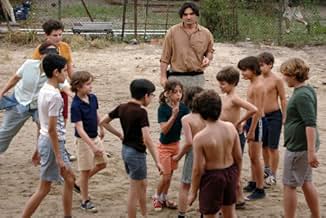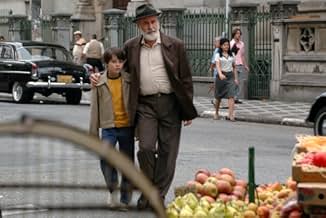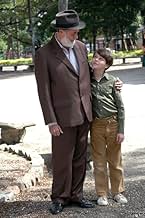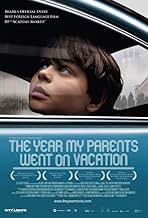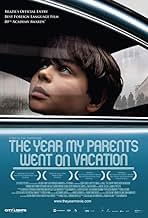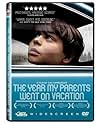IMDb-BEWERTUNG
7,3/10
6726
IHRE BEWERTUNG
Füge eine Handlung in deiner Sprache hinzuA boy is left alone in a Jewish neighborhood in 1970, when the World Cup coincides with political crackdowns by the military dictatorship.A boy is left alone in a Jewish neighborhood in 1970, when the World Cup coincides with political crackdowns by the military dictatorship.A boy is left alone in a Jewish neighborhood in 1970, when the World Cup coincides with political crackdowns by the military dictatorship.
- Auszeichnungen
- 32 Gewinne & 38 Nominierungen insgesamt
Handlung
WUSSTEST DU SCHON:
- WissenswertesBrazil's Official Submission to the Best Foreign Language Film Category of the 80th Annual Academy Awards. The film was one of the nine films that made it to the January's short list but failed to secure the nomination.
- PatzerWhen Mauro arrives in São Paulo, he looks out to the car window noticing the tall buildings - the known Banespa Tower (now Farol Santander) and the Marchetti building, located in the city's downtown. Not only it's a shot on reverse but completely unpractical to the place he and his parents were going - Bom Retiro is located below downtown - and the particular area they were going, shot from right to the left, is completely off traffic since it's an one-way street that only moves from left to right.
- VerbindungenFeatured in Por Dentro do Filme 'O Ano em que Meus Pais Saíram de Férias' (2006)
Ausgewählte Rezension
Twelve-year-old Mauro (Michel Joelsas) is a soccer fan who spends hours playing table soccer in his suburban home in Belo Horizonte, Brazil and fantasizes about playing soccer with Pelé and Tostao, the heroes of the Brazilian soccer team that is about to compete for its third World Cup title. He hardly even blinks when his parents tell him that they are going on vacation and will be dropping him off at his grandfather's apartment in Sao Paolo. Brazil's official submission for the 2008 Oscars in the Best Foreign Film category, The Year My Parents Went on Vacation contains all the ingredients for a Hollywood-style exercise in cliché-ridden sentimentality an adorable young boy, a cantankerous but wise old man, and a world-class sports tournament. Yet director Cao Hamburger meshes these elements into a film that is nuanced, honest, and genuinely touching and, in the process, shows how an attitude of welcoming hospitality can make a difference in the lives of those who feel abandoned.
Set in Brazil in 1970 against a backdrop of military dictatorship, Mauro's father (Eduardo Moreira) and Catholic mother (Simone Spoladore) have been forced to go underground because of their political opposition to the government of General Emilio Medici, a military dictator but do not reveal to Mauro the truth about their leaving. Telling the boy that they will come back for him before the start of the World Cup Soccer Tournament, they deliver him to the home of his grandfather Motel (Paulo Autran) in the mostly Jewish Bom Retiro district of Sao Paulo but do not realize that grandpa has just died of a heart attack in his barbershop.
Tired of waiting for his grandfather to return, Mauro enlists the help of a neighbor, an aging Jewish bachelor Shlomo (Germano Haiut) who reluctantly takes him in but is not happy with his newfound task of caring for the youngster. He chastises the boy after he rejects eating herring for breakfast and slaps him across the face when he plays soccer in the hallways while wearing his prayer shawl. Shlomo becomes even more petulant when he inadvertently discovers that Mauro (whom he has been calling Moishela) is a "goy" who has not been circumcised (a very unlikely event when there is a Jewish father). It is only when the rabbi tells him that, like Moses, Mauro has been left on his doorstep by God that he begins to treat Moishela with respect and invites members of the local synagogue to offer him lunch each day at their different apartments.
Mauro's love of soccer helps him to befriend the local Jewish children, forming a bond with adorable 11-year-old Hanna (Daniela Piepsyk) and the community of Italian, Greek and Arab immigrants who are united in their devotion to the Brazilian soccer team. Joelsas is excellent as the highly intelligent energetic boy who must adapt to a strange environment far removed from his familiar surroundings. The film is almost stolen, however, by Piepsyk as the tomboyish Hanna who collects money from the boys to give them a peek at women trying on clothes in her mother's dress shop. When the World Cup begins, however, all the attention in the neighborhood is on soccer but for Mauro, it is mostly a reminder of his parents promise to return.
Spoken mostly in Yiddish, The Year My Parents Went on Vacation contains elements of The Cup, Running on Empty, and Under the Same Moon, but distinguishes itself by the freshness of its light-hearted approach and the outstanding performances of its mostly non-professional actors. Though not primarily a political coming-of-age film, when Hamburger deftly shifts from a rock n' roll dance floor to the sound of fascist soldiers on horseback making arrests of suspected dissidents, it is a jarring introduction to a young man's loss of innocence.
Set in Brazil in 1970 against a backdrop of military dictatorship, Mauro's father (Eduardo Moreira) and Catholic mother (Simone Spoladore) have been forced to go underground because of their political opposition to the government of General Emilio Medici, a military dictator but do not reveal to Mauro the truth about their leaving. Telling the boy that they will come back for him before the start of the World Cup Soccer Tournament, they deliver him to the home of his grandfather Motel (Paulo Autran) in the mostly Jewish Bom Retiro district of Sao Paulo but do not realize that grandpa has just died of a heart attack in his barbershop.
Tired of waiting for his grandfather to return, Mauro enlists the help of a neighbor, an aging Jewish bachelor Shlomo (Germano Haiut) who reluctantly takes him in but is not happy with his newfound task of caring for the youngster. He chastises the boy after he rejects eating herring for breakfast and slaps him across the face when he plays soccer in the hallways while wearing his prayer shawl. Shlomo becomes even more petulant when he inadvertently discovers that Mauro (whom he has been calling Moishela) is a "goy" who has not been circumcised (a very unlikely event when there is a Jewish father). It is only when the rabbi tells him that, like Moses, Mauro has been left on his doorstep by God that he begins to treat Moishela with respect and invites members of the local synagogue to offer him lunch each day at their different apartments.
Mauro's love of soccer helps him to befriend the local Jewish children, forming a bond with adorable 11-year-old Hanna (Daniela Piepsyk) and the community of Italian, Greek and Arab immigrants who are united in their devotion to the Brazilian soccer team. Joelsas is excellent as the highly intelligent energetic boy who must adapt to a strange environment far removed from his familiar surroundings. The film is almost stolen, however, by Piepsyk as the tomboyish Hanna who collects money from the boys to give them a peek at women trying on clothes in her mother's dress shop. When the World Cup begins, however, all the attention in the neighborhood is on soccer but for Mauro, it is mostly a reminder of his parents promise to return.
Spoken mostly in Yiddish, The Year My Parents Went on Vacation contains elements of The Cup, Running on Empty, and Under the Same Moon, but distinguishes itself by the freshness of its light-hearted approach and the outstanding performances of its mostly non-professional actors. Though not primarily a political coming-of-age film, when Hamburger deftly shifts from a rock n' roll dance floor to the sound of fascist soldiers on horseback making arrests of suspected dissidents, it is a jarring introduction to a young man's loss of innocence.
- howard.schumann
- 7. Juni 2008
- Permalink
Top-Auswahl
Melde dich zum Bewerten an und greife auf die Watchlist für personalisierte Empfehlungen zu.
Details
- Erscheinungsdatum
- Herkunftsland
- Sprachen
- Auch bekannt als
- The Year My Parents Went on Vacation
- Drehorte
- Produktionsfirmen
- Weitere beteiligte Unternehmen bei IMDbPro anzeigen
Box Office
- Budget
- 3.000.000 R$ (geschätzt)
- Bruttoertrag in den USA und Kanada
- 807.117 $
- Eröffnungswochenende in den USA und in Kanada
- 80.655 $
- 17. Feb. 2008
- Weltweiter Bruttoertrag
- 3.218.370 $
- Laufzeit1 Stunde 50 Minuten
- Farbe
- Sound-Mix
- Seitenverhältnis
- 1.85 : 1
Zu dieser Seite beitragen
Bearbeitung vorschlagen oder fehlenden Inhalt hinzufügen

Oberste Lücke
By what name was O Ano em Que Meus Pais Saíram de Férias (2006) officially released in India in English?
Antwort






